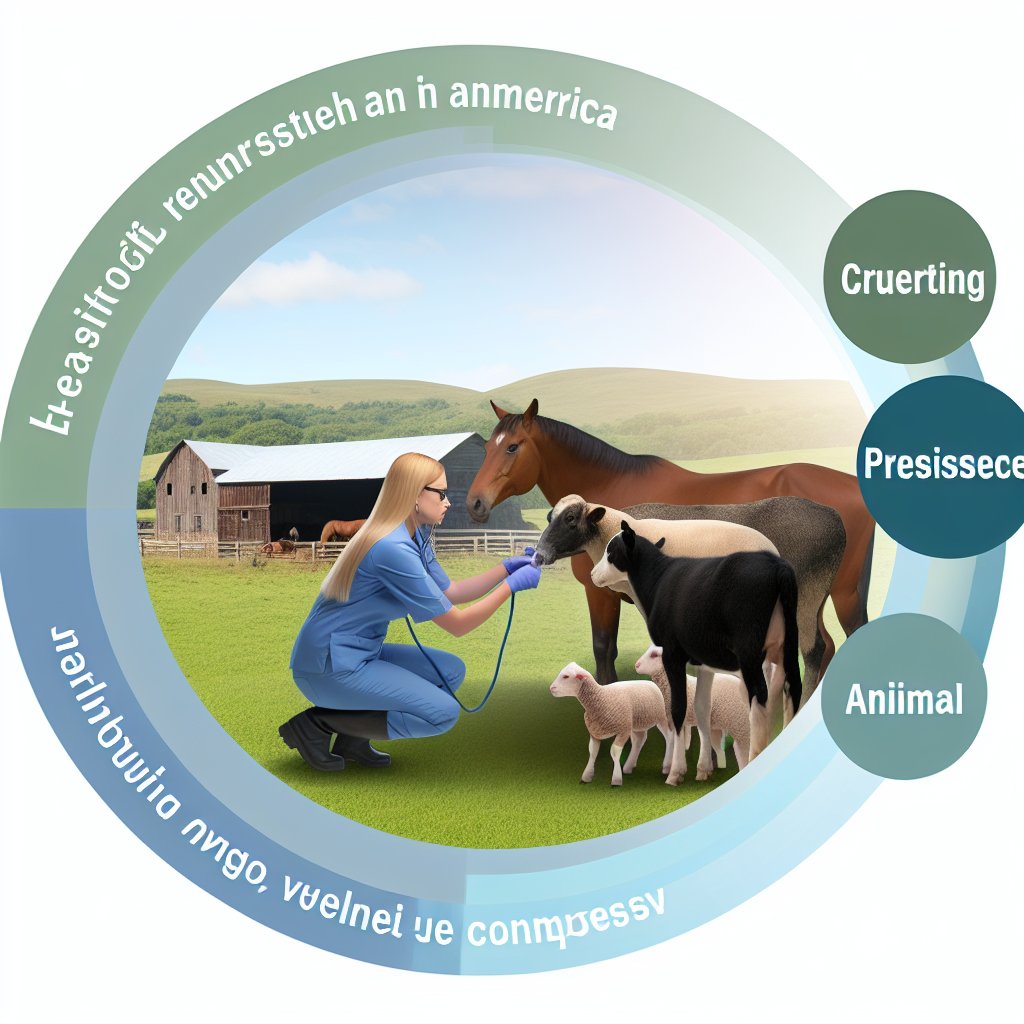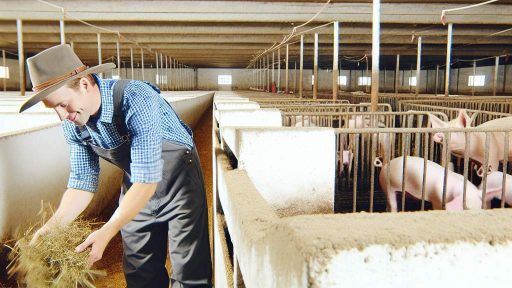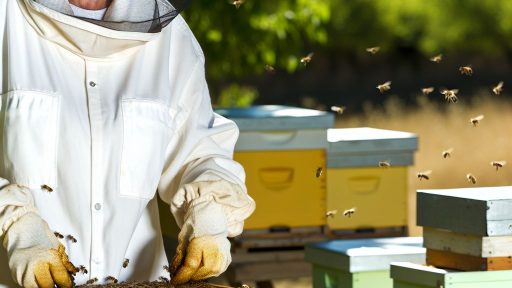Introduction to Animal Welfare in Organic Farming
Animal welfare is a critical component of organic farming.
This focus stems from a commitment to treat animals humanely.
Organic standards promote the well-being of livestock on farms.
In fact, healthy animals contribute to sustainable farming practices.
Farmers are encouraged to follow holistic approaches to care.
Understanding Animal Welfare Principles
Animal welfare encompasses aspects of physical and mental health.
Good welfare includes being free from pain and suffering.
Additionally, animals must have the opportunity to express natural behavior.
Thus, organic farms aim to provide environments that promote these aspects.
The Role of Organic Certification
Organic certification plays a pivotal role in ensuring animal welfare.
This certification establishes specific standards for livestock management.
Farmers must adhere to guidelines that promote animal health.
Moreover, certified farms are regularly inspected to verify compliance.
This process enhances consumer confidence in organic products.
Benefits of High Animal Welfare Standards
High animal welfare standards yield numerous advantages.
Transform Your Agribusiness
Unlock your farm's potential with expert advice tailored to your needs. Get actionable steps that drive real results.
Get StartedHealthy animals result in improved produce quality.
Moreover, satisfied livestock can lead to higher productivity levels.
Farmers can benefit economically from implementing these standards.
Additionally, such practices enhance the farm’s public image.
Challenges in Maintaining Animal Welfare
Despite the benefits, challenges in maintaining animal welfare exist.
Limited resources can hinder farmers’ ability to meet standards.
Weather and environmental conditions may also impact animal care.
Furthermore, knowledge gaps about animal welfare practices can arise.
Education and training are essential to overcoming these hurdles.
Legal and Ethical Frameworks for Animal Welfare Standards
Overview of Animal Welfare Legislation
Animal welfare legislation establishes the legal standards for humane treatment of animals.
These laws ensure that the rights and needs of animals are respected and protected.
In many countries, such regulations are developed through collaboration between governments and animal welfare organizations.
Examples include the Animal Welfare Act in the United States and the Animal Welfare Ordinance in the European Union.
Ethical Principles in Animal Husbandry
Alongside legal standards, ethical principles guide animal husbandry practices.
These principles emphasize the intrinsic value of animals and their well-being.
Farmers are encouraged to engage in practices that not only comply with legal obligations but also reflect ethical considerations.
For instance, the Five Freedoms framework outlines key welfare standards for livestock.
- Freedom from hunger and thirst
- Freedom from discomfort
- Freedom from pain, injury, or disease
- Freedom to express normal behavior
- Freedom from fear and distress
The Role of Certification Programs
Certification programs play a pivotal role in promoting animal welfare in organic livestock operations.
These programs set standards that align with both ethical values and legal requirements.
Certification helps consumers identify products that meet high animal welfare standards.
Examples include USDA Organic and Animal Welfare Approved certifications.
These labels assure customers of humane treatment in the production process.
Challenges in Implementation
Despite existing frameworks, challenges persist in enforcing animal welfare standards.
Many farmers may struggle with compliance due to financial constraints.
Showcase Your Farming Business
Publish your professional farming services profile on our blog for a one-time fee of $200 and reach a dedicated audience of farmers and agribusiness owners.
Publish Your ProfileIn addition, varying state or regional regulations can create confusion.
Education and resources are crucial for helping farmers meet these standards effectively.
Future Directions for Animal Welfare
Looking ahead, there is a growing recognition of the need for dynamic frameworks in animal welfare.
As societal views on animal rights evolve, so too must the laws and ethical guidelines.
Advocates stress the importance of continuous dialogue among stakeholders.
These include farmers, consumers, and regulatory bodies.
Such engagement will help shape a more humane approach to animal management in agriculture.
Key Principles of Organic Livestock Management
Animal Welfare as a Priority
Animal welfare is central to organic livestock management.
Farmers ensure animals receive humane treatment throughout their lives.
Furthermore, providing a stress-free environment enhances animal health.
Nutritional Standards
Quality nutrition is essential for organic livestock health.
Farmers must provide a balanced diet with organic feed.
This diet supports better growth and productivity.
Access to Outdoors
All animals must have access to outdoor spaces.
This access allows for natural behaviors and social interactions.
Consequently, it improves overall well-being and reduces stress.
Breeding Practices
Natural breeding methods align with organic principles.
Farmers avoid artificial insemination to promote healthy genetics.
Hence, this practice encourages robust animal populations.
Environmental Stewardship
Organic livestock systems prioritize ecological health.
Farmers use sustainable practices to minimize environmental impacts.
This approach conserves resources and protects biodiversity.
Continuous Education
Staying informed is crucial for organic livestock management.
Farmers attend workshops and training on best practices.
Such education helps improve animal welfare and farm productivity.
Gain More Insights: Optimizing Pasture Rotation For Sustainable Grass-Fed Cattle Feed Efficiency
Best Practices for Maintaining Animal Health and Well-Being
Providing Adequate Space
Animals require sufficient space to thrive in their environment.
Overcrowding can lead to stress and aggression among animals.
Implementing proper stocking densities promotes animal comfort.
Design barns and pastures with ample room for movement.
Furthermore, allow animals to express natural behaviors.
Ensuring Access to Clean Water
Clean water is vital to animal health and well-being.
Animals should have constant access to fresh, clean water.
Monitor water sources regularly for contamination.
Additionally, provide enough water stations to accommodate all animals.
Fostering Positive Social Interactions
Social structure influences animal behavior and mental health.
Encourage interactions by grouping animals appropriately.
Minimize isolation, as it can cause stress and anxiety.
Monitor group dynamics to prevent bullying or aggression.
Implementing Regular Health Checks
Routine health assessments are essential for animal welfare.
Showcase Your Farming Business
Publish your professional farming services profile on our blog for a one-time fee of $200 and reach a dedicated audience of farmers and agribusiness owners.
Publish Your ProfileConduct physical examinations to spot illnesses early.
Additionally, vaccinations and parasite control should be pursued regularly.
Keep accurate records of each animal’s health history.
Providing Nutritious Diets
A balanced diet promotes good health in livestock.
Consult a veterinarian to develop appropriate feeding plans.
Ensure all feed is fresh and free from contaminants.
Moreover, adjust diets based on life stage and activity level.
Offering Shelter from the Elements
Animals need protection from harsh weather conditions.
Provide adequate shelter that allows for temperature regulation.
Ensure that the shelter is clean, dry, and well-ventilated.
Moreover, offer bedding to promote comfort and warmth.
Training and Handling Techniques
Gentle handling reduces stress and fear in livestock.
Use positive reinforcement for training animals.
Consistency in handling techniques builds trust with animals.
Additionally, ensure all workers are trained in humane handling practices.
Monitoring Psychological Well-Being
Animal welfare includes psychological, as well as physical health.
Monitor for signs of stress, such as changes in behavior.
Provide environmental enrichment to stimulate natural behaviors.
Furthermore, a calm atmosphere can enhance overall well-being.
Practicing Ethical Breeding Strategies
Breeding practices should prioritize animal health and welfare.
Select animals based on both health and behavior.
Avoid inbreeding, as it can lead to genetic disorders.
Additionally, consider the welfare of offspring during breeding decisions.
Find Out More: Improving Animal Welfare Through Ethical Feed And Housing Practices In America
Housing and Environmental Enrichment for Organic Livestock
Importance of Proper Housing
Proper housing is essential for organic livestock welfare.
It protects animals from extreme weather conditions.
Well-designed housing promotes comfort and safety.
Appropriate space allows for natural behaviors.
This approach enhances overall animal health and productivity.
Key Features of Organic Livestock Housing
Organic livestock housing should have specific features.
- Ample space for movement and social interaction.
- Well-ventilated areas to prevent respiratory issues.
- Soft bedding materials to enhance comfort.
- Access to outdoor areas for fresh air and sunshine.
- Clean water sources available at all times.
Environmental Enrichment Strategies
Environmental enrichment is vital for mental stimulation.
It helps reduce stress and encourages natural behaviors.
Provide various materials for animals to explore and interact with.
- Forage items to encourage natural foraging behaviors.
- Structures for climbing and jumping to promote physical activity.
- Visual barriers to create a sense of privacy and security.
- Toys and manipulable objects to stimulate cognitive engagement.
Monitoring and Adjusting Conditions
Regular monitoring of housing conditions is necessary.
Evaluate temperature and humidity levels regularly.
Ensure that animals exhibit positive behaviors consistently.
Adjust housing features based on animal needs and feedback.
This proactive approach ensures optimal welfare for organic livestock.
Gain More Insights: Understanding Milk Quality Standards in Dairy Farming
Feeding and Nutrition for Healthy Animals in Organic Operations
Importance of Nutritional Balance
Proper nutrition is essential for animal health and productivity.
Showcase Your Farming Business
Publish your professional farming services profile on our blog for a one-time fee of $200 and reach a dedicated audience of farmers and agribusiness owners.
Publish Your ProfileA balanced diet supports immunity and overall well-being.
In organic livestock operations, this balance prevents nutritional deficiencies.
Moreover, it enhances growth rates and reproductive performance.
Components of Organic Feed
Organic feed must comply with specific regulations.
It should contain natural ingredients without synthetic additives.
Common components include grains, legumes, and forage.
These ingredients provide essential nutrients and energy.
Additionally, supplements may be included to boost nutrition.
Feeding Strategies in Organic Operations
Implementing effective feeding strategies maximizes animal health.
Frequent small meals often improve digestion and metabolism.
Moreover, grazing systems promote natural feeding behaviors.
Farmers can also use rotational grazing to improve pasture health.
This method encourages diverse foraging and nutrient intake.
Monitoring and Adjusting Diets
Regular monitoring ensures livestock receive adequate nutrition.
Farmers should assess animals’ body conditions regularly.
Adjusting diets based on animal weights is crucial.
Additionally, seasonal changes may require dietary modifications.
For instance, during colder months, energy needs may increase.
Supplementation and Quality Assessment
Quality feed is vital for maintaining high health standards.
Farmers should select feeds that meet organic certification standards.
Regular testing of feed for contaminants is essential.
Supplements, such as minerals and vitamins, may enhance diets.
Using herbal supplements can also boost immunity and health.
Educating Farm Staff
Training staff on nutrition improves overall animal management.
Knowledgeable employees can implement effective feeding regimens.
Continuous education helps keep staff updated on best practices.
Furthermore, engaging in workshops can enhance understanding.
Sharing successful strategies amongst farmers promotes community learning.
Uncover the Details: Best Feeding Practices for Optimal Swine Growth and Health

Monitoring and Assessing Animal Welfare Outcomes
Importance of Monitoring
Monitoring animal welfare in organic livestock operations is essential.
It helps identify issues early and ensures compliance with welfare standards.
Moreover, regular monitoring supports continuous improvement.
Observation Techniques
Employ various observation techniques to assess animal welfare.
Direct observation provides immediate insights into animal behavior.
Animal-based measures are crucial for evaluating their health and wellbeing.
Consider using tools like body condition scoring and behavior assessments.
Data Collection Methods
Implement robust data collection methods for effective monitoring.
Utilize qualitative and quantitative data to get a comprehensive view.
Conduct surveys and interviews with animal handlers regularly.
Digital tools can streamline data collection and analysis.
Showcase Your Farming Business
Publish your professional farming services profile on our blog for a one-time fee of $200 and reach a dedicated audience of farmers and agribusiness owners.
Publish Your ProfileIndicators of Welfare
Identify key welfare indicators for specific livestock species.
For example, observe health, behavior, and productivity metrics.
Physical health indicators include lameness and body condition.
Behavioral indicators may involve social interactions and stress responses.
Feedback Mechanisms
Establish feedback mechanisms to improve welfare practices.
Encourage staff to report concerns and suggestions regularly.
Implement changes based on observed outcomes and feedback.
Transparent communication fosters a culture of continuous improvement.
Regular Welfare Assessments
Conduct regular welfare assessments to ensure high standards.
Set a schedule for evaluations, including both internal and external audits.
Utilize trained assessors to provide unbiased feedback.
Review assessment results to identify trends and areas for enhancement.
Challenges and Solutions in Achieving Animal Welfare in Organic Systems
Understanding Animal Welfare Needs
Animal welfare encompasses physical and psychological well-being.
Organic systems focus on natural behaviors and stress reduction.
Producers must recognize specific needs of different species.
This includes space requirements, social interactions, and diet.
Understanding these needs is crucial for effective management.
Identifying Common Challenges
Organic livestock operations face unique challenges.
Resource limitations can impact animal welfare positively and negatively.
Additionally, weather conditions affect the health of livestock.
These factors lead to issues such as stress and disease prevalence.
Farmers often struggle with financial constraints and regulatory demands.
Implementing Practical Solutions
Farmers can adopt proactive measures to enhance animal welfare.
Providing adequate shelter protects animals from harsh conditions.
Managed grazing improves soil health and animal nutrition.
Training staff on animal behavior increases welfare awareness.
Regular health checks ensure early detection of problems.
Utilizing Technology and Innovation
Modern technology offers effective solutions for livestock management.
Sensors can monitor environmental conditions in real-time.
Data analytics help farmers make informed decisions.
Innovative feeding systems can enhance nutritional intake.
Technological advancements can streamline health monitoring processes.
Involving the Community and Stakeholders
Engaging with local communities fosters support for animal welfare.
Collaborations can lead to knowledge sharing and resource pooling.
Consumers increasingly demand transparency regarding animal care.
Thus, farmers should communicate their practices clearly.
Establishing networks with other producers promotes best practices.
Case Studies of Successful Organic Livestock Operations
Farmstead Organics
Farmstead Organics operates on 50 acres in Vermont.
They prioritize high animal welfare standards.
The farm offers pasture-based systems for their cattle.
Showcase Your Farming Business
Publish your professional farming services profile on our blog for a one-time fee of $200 and reach a dedicated audience of farmers and agribusiness owners.
Publish Your ProfileAdditionally, they provide shelter and enrichment activities.
Farmstead Organics has seen a 30% increase in milk production.
Customers appreciate their commitment to humane practices.
Sunny Acres Farm
Sunny Acres Farm focuses on heritage breed pigs.
They utilize rotational grazing to improve soil health.
This method enhances animal health and reduces stress.
The farm also hosts educational workshops for local farmers.
This encourages others to adopt organic practices.
Green Fields Livestock
Green Fields Livestock emphasizes transparency in operations.
They offer a “farm-to-table” experience for consumers.
Visitors can observe their pasture-raised chickens in action.
Green Fields practices animal rotation to prevent overgrazing.
This approach has improved livestock health significantly.
Maple Hill Organics
Maple Hill Organics features a diverse range of animals.
They blend sheep, goats, and chickens on their farm.
This diversity boosts overall farm resilience.
Their multi-species grazing reduces pest populations.
They prioritize preventive health measures for their animals.
Sunrise Homestead
Sunrise Homestead operates an organic egg production facility.
They implement mobile chicken coops for pasture access.
This setup promotes hen welfare and egg quality.
Furthermore, they emphasize community involvement in their practices.
Local schools visit to learn about organic farming.
Lessons Learned from Case Studies
These successful operations share common principles.
High animal welfare improves product quality and profitability.
Engaging with the community fosters trust and support.
Additionally, utilizing natural systems enhances sustainability.
These case studies demonstrate that organic livestock farming can thrive.
Additional Resources
National Organic Program (NOP); Organic … – Federal Register




